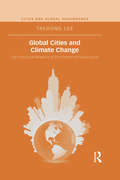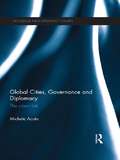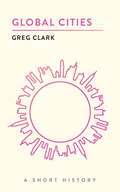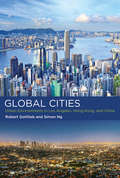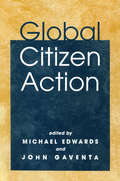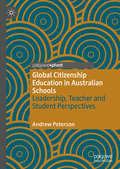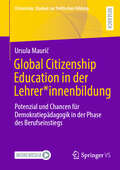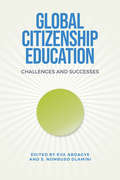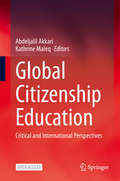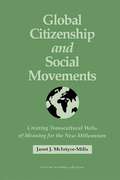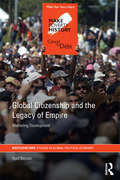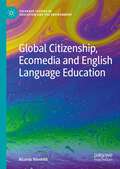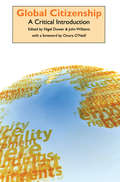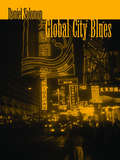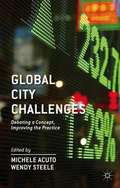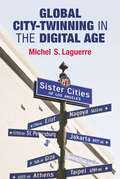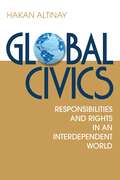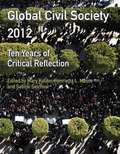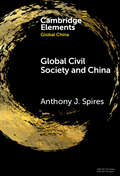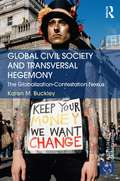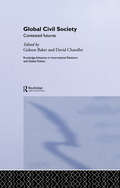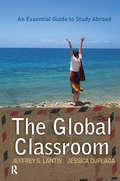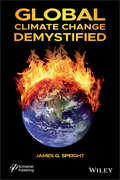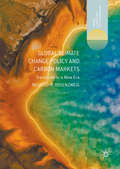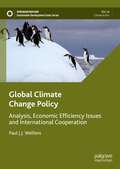- Table View
- List View
Global Cities and Climate Change: The Translocal Relations of Environmental Governance (Cities and Global Governance)
by Taedong LeeCities have led the way to combat climate change by planning and implementing climate mitigation and adaptation policies. These local efforts go beyond national boundaries. Cities are forming transnational networks to enhance their understandings and practices for climate policies. In contrast to national governments that have numerous obstacles to cope with global climate change in the international and national level, cities have become significant international actors in the field of international relations and environmental governance. Global Cities and Climate Change examines the translocal relations of cities that have made an international effort to collectively tackle climate change. Compared to state-centric terms, international or trans-national relations, trans-local relations look at policies, politics, and interactions of local governments in the globalized world. Using multi-methods such as multi-level analysis, comparative case studies, regression analysis and network analysis, Taedong Lee illustrates why some cities participated in transnational climate networks for cities; under what conditions cities internationally cooperate with other cities, with which cities; and which factors influence climate policy performance. An essential read to all those who wish to understand the driving factors for local governments’ engagement in global climate governance from a theoretical as well as practical point of view. Lee makes a valuable contribution to the fields of international relations, environmental policies, and urban studies.
Global Cities, Governance and Diplomacy: The Urban Link (Routledge New Diplomacy Studies)
by Michele AcutoThis book illustrates the importance of global cities for world politics and highlights the diplomatic connections between cities and global governance. While there is a growing body of literature concerned with explaining the transformations of the international order, little theorisation has taken into account the key metropolises of our time as elements of these revolutions. The volume seeks to fill this gap by demonstrating how global cities have a pervasive agency in contemporary global governance. The book argues that looking at global cities can bring about three fundamental advantages on traditional IR paradigms. First, it facilitates an eclectic turn towards more nuanced analyses of world politics. Second, it widens the horizon of the discipline through a multiscalar image of global governance. Third, it underscores how global cities have a strategic diplomatic positioning when it comes to core contemporary challenges such as climate change. This book will be of much interest to students of urban studies, global governance, diplomacy and international relations in general.
Global Cities: A Short History
by Greg ClarkWhy have some cities become great global urban centers, and what cities will be future leaders? <p><p> From Athens and Rome in ancient times to New York and Singapore today, a handful of cities have stood out as centers of global economic, military, or political power. In the twenty-first century, the number of truly global cities is greater than ever before, reflecting the globalization of both economic and political power.In Global Cities: A Short History, Greg Clark, an internationally renowned British urbanist, examines the enduring forces-such as trade, migration, war, and technology-that have enabled some cities to emerge from the pack into global leadership. Much more than a historical review, Clark’s book looks to the future, examining the trends that are transforming cities around the world as well as the new challenges all global cities, increasingly, will face. <p> Which cities will be the global leaders of tomorrow? What are the common issues and opportunities they will face? What kinds of leadership can make these cities competitive and resilient? Clark offers answers to these and similar questions in a book that will be of interest to anyone who lives in or is affected by the world’s great urban areas.
Global Cities: Urban Environments in Los Angeles, Hong Kong, and China (Urban and Industrial Environments)
by Robert Gottlieb Simon NgHow Los Angeles, Hong Kong, and China deal with such urban environmental issues as ports, goods movement, air pollution, water quality, transportation, and public space.Over the past four decades, Los Angeles, Hong Kong, and key urban regions of China have emerged as global cities—in financial, political, cultural, environmental, and demographic terms. In this book, Robert Gottlieb and Simon Ng trace the global emergence of these urban areas and compare their responses to a set of six urban environmental issues.These cities have different patterns of development: Los Angeles has been the quintessential horizontal city, the capital of sprawl; Hong Kong is dense and vertical; China's new megacities in the Pearl River Delta, created by an explosion in industrial development and a vast migration from rural to urban areas, combine the vertical and the horizontal. All three have experienced major environmental changes in a relatively short period of time. Gottlieb and Ng document how each has dealt with challenges posed by ports and the movement of goods, air pollution (Los Angeles, Hong Kong, and urban China are all notorious for their hazardous air quality), water supply (all three places are dependent on massive transfers of water) and water quality, the food system (from seed to table), transportation, and public and private space. Finally they discuss the possibility of change brought about by policy initiatives and social movements.
Global Citizen Action
by John Gaventa Michael EdwardsCivil society, or citizen's groups, have taken centre stage in international policy debates and global problem solving. They hold out the promise of a global community and global governance. This volume, by leading scholars and participants, shows how to understand the changes that are occurring, particularly in relation to the international institutions involved. It includes case studies from all the major social movements of the 1990s.
Global Citizenship Education in Australian Schools: Leadership, Teacher and Student Perspectives
by Andrew PetersonThis book explores how Australian secondary schools prepare their students for global citizenship. Globalisation has irrevocably changed modern countries and societies, and the benefits and pressures this brings are being felt as never before. Drawing on empirical data from six Australian secondary schools, the author examines how school leaders and teachers understand global citizenship, how they translate this into their practice, and how students experience and make sense of global citizenship education. In doing so, the book portrays how school leaders, teachers and students grapple with key issues central to global citizenship education, including how they work to mediate some of the tensions involved. While the book concentrates on the Australian context, its findings and analysis have resonance for other countries in which global citizenship education operates as a core goal of education and schooling.
Global Citizenship Education in der Lehrer*innenbildung: Potenzial und Chancen für Demokratiepädagogik in der Phase des Berufseinstiegs (Citizenship. Studien zur Politischen Bildung)
by Ursula MauričLehrpersonen stehen heute mehr denn je unter enormen Druck, mit und in ihrem Unterricht auf gesellschaftliche Entwicklungen zu reagieren. Aus dem Blick gerät dabei oft, dass es in der pädagogischen Arbeit vielmehr darum gehen muss, Alternativen zu einer bestehenden Ordnung von Ungleichheit, Ungerechtigkeit und Ausgrenzung ins Leben zu bringen, die sich in Bildungssystemen und letztlich im schulischen Alltag widerspiegeln. Als einen dafür möglichen Orientierungsrahmen in einer westlichen urbanen Migrationsgesellschaft und unter den Einflüssen von Globalisierung beschreibt Ursula Maurič eine kritische und inklusive Global Citizenship Education (GCE). Diese Interpretation von GCE beruft sich auf Konzepte einer kritischen Pädagogik und deren Fortführung in einer kritischen, postkolonialen GCE. Die Autorin stellt damit einen deutlichen Bezug zu einer kritischen politischen Bildung und besonders zu Demokratiepädagogik her. Letztlich aber geht Ursula Maurič der Frage nach, auf welche Weise Angebote der Lehrer*innenbildung zu einer kritischen und inklusiven GCE dringend notwendige Transformationsprozesse schulischer Bildung initiieren und mitgestalten können. Und sie verweist auf das hohe Potenzial, das die für Professionalisierung von Lehrpersonen besonders sensible Phase des Berufseinstiegs – gemeint sind die ersten Jahre im Beruf – in sich trägt.
Global Citizenship Education: Challenges and Successes
by Aboagye And DlaminiThe idea of citizenship and conceptions of what it means to be a good citizen has evolved over time. On the one hand, good citizenship entails the ability to live with others in diverse societies, and to promote a common set of values of acceptance, human rights, and democracy. On the other hand, in order to compete in the global economy, nations require a more innovative, autonomous, inventive, and reflective workforce, meaning good citizens are also those who successfully participate in the economic development of themselves and their country. At the same time, supporting citizens to realize their responsibilities beyond the nation has become important in this rapidly changing and interconnected world. These competing citizenship purposes often compel people to either ignore or act ambivalent to democratic and human rights values. That is, profit-driven labor exploitation, for instance, contradicts human rights and democratic tenants. Thus, global citizenship education is fundamental to teaching, learning and redressing sociopolitical, economic and environmental exploitation, globally. Detailing its historical development to be recognized as a field of study, Global Citizenship Education provides a critical discourse on global citizenship education (GCE). Authors in this collection offer underpinnings of global citizenship education by discussing its contemporary theories and methodologies, and specific case studies that illustrate the application of GCE initiatives. Aboagye and Dlamini aim to motivate learners and educators in post-secondary institutions not only to understand the issues of social and economic inequality, political and civil unrest facing us, but also to take action that will lead to equitable change in local and global spaces.
Global Citizenship Education: Critical and International Perspectives
by Abdeljalil Akkari Kathrine MaleqThis open access book takes a critical and international perspective to the mainstreaming of the Global Citizenship Concept and analyses the key issues regarding global citizenship education across the world. In that respect, it addresses a pressing need to provide further conceptual input and to open global citizenship agendas to diversity and indigeneity. Social and political changes brought by globalisation, migration and technological advances of the 21st century have generated a rise in the popularity of the utopian and philosophical idea of global citizenship. In response to the challenges of today’s globalised and interconnected world, such as inequality, human rights violations and poverty, global citizenship education has been invoked as a means of preparing youth for an inclusive and sustainable world. In recent years, the development of global citizenship education and the building of students’ global citizenship competencies have become a focal point in global agendas for education, international educational assessments and international organisations. However, the concept of global citizenship education still remains highly contested and subject to multiple interpretations, and its operationalisation in national educational policies proves to be challenging. This volume aims to contribute to the debate, question the relevancy of global citizenship education’s policy objectives and to enhance understanding of local perspectives, ideologies, conceptions and issues related to citizenship education on a local, national and global level. To this end, the book provides a comprehensive and geographically based overview of the challenges citizenship education faces in a rapidly changing global world through the lens of diversity and inclusiveness.
Global Citizenship and Social Movements: Creating Transcultural Webs of Meaning for the New Millennium
by Janet McIntyreIn this book, Janet McIntyre addresses the need for transcultural thinking tools, to not only mend problems in the global environment but also to understand the essential nature of the problems. Thinking tools comprise the analytical concepts which organise, disorganise, pattern and question thoughts about the social and natural world. Specifically, the concepts introduced in this book are 'global citizenship', 'human rights', 'responsibility', 'social movements' and 'transcultural webs of meaning'.
Global Citizenship and the Legacy of Empire: Marketing Development (RIPE Series in Global Political Economy)
by April BiccumThis book investigates the parallels between mainstream development discourse and colonial discourse as theorized in the work of Homi Bhabha, Gayatri Spivak and Edward Said. Aiming to repoliticize post-colonial theory by applying its understandings to contemporary political discourses, author April Biccum critically examines the ways in which development in its current form has recently begun to be promoted among the metropolitan public. Biccum contends that what has begun is a sustained marketing campaign for development that is a repetition, augmentation and ultimately much greater success of the work of the Empire Marketing Board of 1926. Demonstrating how this marketing campaign for development attempts to facilitate support for neo-liberal globalization, Biccum contends that this theatre of legitimation is emerging in response to growing critical voices and counter-hegemonic activity on the international stage. Featuring in depth analyses of the UK, cultural values, DfID, the commemoration of the slave trade and campaigns including Live8 and Make Poverty History, this book will be of interest to students and scholars of postcolonial studies, development studies, and international political economy. It will also offer insights valuable to a wider range of subjects including critical theory and globalization studies.
Global Citizenship, Ecomedia and English Language Education (Palgrave Studies in Education and the Environment)
by Ricardo RömhildThis book presents a unique framework for the inclusion of ecomedia in the English language classroom to help learners cultivate global citizenship. Foregrounding learner agency in a world at risk, the author proposes a framework that hinges on human rights and critical eco-cosmopolitanism to help learners position themselves in discourses on climate change and act for transformation. The book discusses eco-documentaries as multimodal, factional texts against the background of cutting-edge research, refuting a definition based on the binary of fiction and non-fiction. Translating the insights gained from this discussion to the language education context, learners are conceptualised as active designers of meaning making when engaged with eco-documentaries. Based on this discussion, the book puts forth an innovative, multiliteracies-informed concept which is embedded in a sustainability-oriented pedagogy of hope, which encourages learners to learn and practice languages of hope and advocacy. The book will be of interest to scholars in the fields of ecopedagogy, sustainability education, global citizenship education and cultural learning, film pedagogy and language education, as well as language educators.
Global Citizenship: A Critical Introduction (Edinburgh University Press Ser.)
by John Williams Nigel DowerThe idea of global citizenship is that human beings are "citizens of the world." Whether or not we are global citizens is a topic of great dispute, however those who take part in the debate agree that a global citizen is a member of the wider community of humanity, the world, or a similar whole which is wider than that of a nation-state or other political community of which we are normally thought to be citizens. Through four main sections, the contributors to Global Citizenship discuss global challenges and attempt to define the ways in which globalization is changing the world in which we live. Offering a breadth of coverage to the core rheme of the individual in a global world, Global Citizenship combines two factors-the idea of global responsibility and the development of institutional structures through which this responsibility can be exercised.
Global City Blues
by Daniel Solomon"This is a book about the making of cities and the buildings that compose them. It is about the conditions under which an architect engaged in those activities now works, how those conditions evolved and why they are changing. It is about the qualities of life that are threatened by the ways cities are built at the beginning of the 21st century and intelligent response to those threats. It is about why the city planning ideas and the cultural cuisinart that came in the box with modern architecture are a lingering menace." -- from Global City Blue.In Global City Blues, renowned architect Daniel Solomon presents a perceptive overview and an insightful assessment of how the power and seductiveness of modernist ideals led us astray. Through a series of independent but linked essays, he takes the reader on a personal picaresque, introducing us to people, places, and ideas that have shaped thinking about planning and building and that laid the foundation for his beliefs about the world we live in and the kind of world we should be making.As an alternative, Daniel Solomon discusses the ideas and precepts of New Urbanism, a reform movement he helped found that has risen to prominence in the past decade. New Urbanism offers a vital counterbalance to the forces of sprawl, urban disintegration, and placelessness that have so transformed the contemporary landscape.Global City Blues is a fresh and original look at what the history of urban form can teach us about creating built environments that work for people.
Global City Challenges
by Michele Acuto Wendy SteeleThe contributors illustrate what twin analytical and practical challenges emerge from juxtaposing cultural, economic, historical, postcolonial, virtual, architectural, literary, security and political stances to the concept of the 'global city'.
Global City-Twinning in the Digital Age
by Michel S LaguerreFor many years, cities throughout the globe have developed ties with each other to process and nurture friendship, solidarity, and collaboration. These city relationships constitute a mode of governance distinct from those of cities that are not involved in such cross-border arrangements, with influence that expands far beyond region. In this light, Global City-Twinning in the Digital Age unveils an analysis of intercity relationships both on a global scale and as a global phenomenon with digital communication technologies that play key roles in upgrading traditional practices, enhancing cross-border cooperation, and facilitating the production of digital sister cities. This book analyzes the deployment of sister-city formations and operations throughout the world with a focus on cities of North America, Latin America, North Africa, Europe, and the Mediterranean region. Using a global approach, it discusses friendship, entrepreneurship, urban development, cooperative management, municipal policy, and digital entanglements. It expands the scope of study of sister cities by unveiling the role of immigrants, diaspora, and post-diaspora in the making and functioning of the digital model of sister cities.
Global Civics
by Kemal Dervis Hakan AltinayThe simple yet challenging goal of this book is to deliberate the legitimacy, and advance the feasibility, of an important new concept-the notion of "global civics." We cannot achieve the international cooperation that is needed for a globalizing and interdependent century without embracing and implementing this important concept. The first section of Global Civics is a presentation of the overall idea itself; the second section consists of diverse assessments from around the world of the concept and where it currently stands. The third section discusses various options for a global civics curriculum.Praise for the Global Civics Program"I agree with Hakan Altinay that in order to navigate our global interdependence, we need processes where we all think through our own responsibilities toward other fellow humans and discuss our answers with our peers. A conversation about a global civics is indeed needed, and university campuses are ideal venues for these conversations to start. We should enter this conversation with an open mind, and not insist on any particular point of view. The process is the key, and we should not wait any longer to start it." -Martti Ahtisaari, 2008 Nobel Peace Laureate. "The growing interconnectivity among people across the world is nurturing the realization that we are all part of a global community. This sense of interdependence, commitment to shared universal values, and solidarity among peoples across the world can be channeled to build enlightened and democratic global governance in the interests of all. I hope that universities and think tanks around the world will deploy their significant reservoirs of knowledge and creativity to develop platforms to enable students to study and debate these issues. This project is a contribution toward that goal and I look forward to following it closely." - Kofi Annan, Former Secretary General of the United Nations, 2001 Nobel Peace Laureate
Global Civil Society 2012
by Mary Kaldor Henrietta L. Moore Sabine SelchowActivists and academics look back over ten years of 'politics from below', and ask whether it is merely the critical gaze upon the concept that has changed or whether there is something genuinely new about the way in which civil society is now operating. "
Global Civil Society and China (Elements in Global China)
by Anthony J. SpiresThis Element traces the history of and recent developments in the unstable relationship between global civil society (GCS) and China. It analyses the normative impacts GCS has had on China – including the Chinese state and domestic civil society – and the possibilities created by Beijing's new 'going out' policies for Chinese civil society groups. It examines the rhetoric and reality of GCS as an emancipatory project and argues that 'universal values' underpinned by principles of human rights and democracy have gained currency in China despite official resistance from the government. It argues that while the Chinese party-state is keen to benefit from GCS engagement, Beijing is also determined to minimize any impact outside groups might have on regime security. The Element concludes with some observations about future research directions and the internationalization of Chinese civil society.
Global Civil Society and Transversal Hegemony: The Globalization-Contestation Nexus (Rethinking Globalizations)
by Karen M. BuckleyThere has been clear recognition of tendencies towards uncritically celebrating resistance and the need for critical appraisal within the literature on globalization and contestation. This book provides a conceptual history of global civil society and a critical examination of the politics of resistance in the global political economy. It uses a dialectical method of analysis to illustrate the conceptual stasis of mainstream approaches to questions of globalization and contestation, while demonstrating the potential of a Gramscian approach to reconstitute hegemony as a key analytical and explanatory tool. Buckley offers insight to the movements of transversal hegemony and existent and anticipated modes of social relation through the case studies of the World Social Forum and the World People's Conference on Climate Change. Offering a more comprehensive understanding of change in the global political economy, this book will be of interest to students and scholars of international political economy, globalization, global civil society, sociology, and the politics resistance.
Global Civil Society: Contested Futures (Routledge Advances in International Relations and Global Politics #Vol. 32)
by David Chandler Gideon BakerFor many commentators, global civil society is revolutionising our approach to global politics, as new non-state-based and border-free expressions of political community challenge territorial sovereignty as the exclusive basis for political community and identity. This challenge 'from below' to the nation-state system is increasingly seen as promising nothing less than a reconstruction, or a re-imagination, of world politics itself. Whether in terms of the democratisation of the institutions of global governance, the spread of human rights across the world, or the emergence of a global citizenry in a worldwide public sphere, global civil society is understood by many to provide the agency necessary for these hoped-for transformations. Global Civil Society asks whether this idea is such a qualitatively new phenomenon after all; whether the transformation of the nation-state system is actually within its reach; and what some of the drawbacks might be.
Global Classroom: An Essential Guide to Study Abroad
by Jeffrey S. Lantis Jessica DuplagaTravel abroad has become a standard feature of global citizenship and many seek help in making sure their travel experiences are fulfilling. University based tours and travel programs are among the most popular for the educated sojourner. This book is aimed at students, professors, and study abroad professionals, but anyone who wants help in preparing for informed and culturally sensitive travel will benefit from its extensive resources. Both a primer for a holistic experience abroad and a practical guide to issues that arise in any travel setting, The Global Classroom is an essential travel companion. It explores the philosophy behind overseas travel, the potential value of the experience, practical preparation for study abroad, selecting the right program, actively engaging in foreign educational settings, reorientation challenges, and exploring pathways for integrating the experience into careers as engaged global citizens. The guide concludes with an appendix containing valuable resources for easy use by all.
Global Climate Change Demystified
by James G. SpeightFor too many years climate change (also referred to as global warming) has been assigned predominantly to the emissions of carbon dioxide though the combustion of fossil fuels. It must never be forgotten or ignored, however, that the Earth is constantly changing since its formation and has gone through different eras like glaciations, among others. These changes need thousands of years to be made visible, and the current increase in the average temperature of the Earth since the pre-industrial period is happening, provided that the measurements of past climatic temperatures are accurate and beyond reproach. Thus, the assessment that the warming trend that has occurred over the past 100 years is very likely to have some origins in natural events. The precise contributions of natural effects and anthropogenic effects on the climate are not known, but it is accurate to conclude that many factors continue to influence climate. Whether or not human activities have become a dominant force in the changing climate and are responsible for most of the warming observed is still open to question. When studying the climate system of the Earth, an area of common confusion that relates to whether climate scientists agree or disagree as to whether or not climate change is happening, or if it is happening, whether or not humans are the primary cause. There are a variety of reasons for this, but a majority of scientists who study climate and publish in peer-reviewed journals agree that human activity is causing the warming of the Earth. The purpose of this book is to weigh all of these various data points and, in a scientific and unemotional way, arrive at likely conclusions regarding global climate change. Whether human activity is the main driver behind our current changes in climate, one thing is certain: Climate change is happening, and we all need to make informed, rather than emotional, decisions.
Global Climate Change Policy and Carbon Markets
by Richard H. RosenzweigIn this book, Richard Rosenzweig, describes the policies proposed and adopted in the first generation of climate change policy-making including the Kyoto Protocol and the carbon markets and assesses their failure to halt the increases of rising emissions of greenhouse gases. Carefully structured throughout, each chapter demonstrate how the first generation of policies failed because they were top down, overly ambitious and complex. The author uses the lessons drawn from this analysis to recommend more modest, targeted policies, arguing that they will be more successful in fighting climate change in the new era of policy-making. An invaluable reference for advanced undergraduate and graduate students in taking relevant courses in Environmental Policy, Law and Business. This book will also be a useful overview for researchers working in the field as well as those working in government and policy.
Global Climate Change Policy: Analysis, Economic Efficiency Issues and International Cooperation (Sustainable Development Goals Series)
by Paul J.J. WelfensThis book considers climate change from an economic and international policy perspective. It argues that an emissions trading systems (ETS) should first be adopted in all G20 countries with those national ETS then integrated into a global ETS. The topic of global warming is at the forefront of international discussions, especially given recent environmental policy changes in the US under Presidents Trump and Biden and the emergence of the Fridays For Future movement.Combatting climate change does not necessitate a trade-off between economic growth and climate policy provided that the latter is consistently linked to new economic policy. Policymakers should support innovation, effective redistribution policies and modern mobility concepts. Moreover, there are crucial links between financial market dynamics and price dynamics in ETS. If measures discussed here are coordinated effectively in the EU/G20, and at the global level, then climate neutrality could be achieved.
